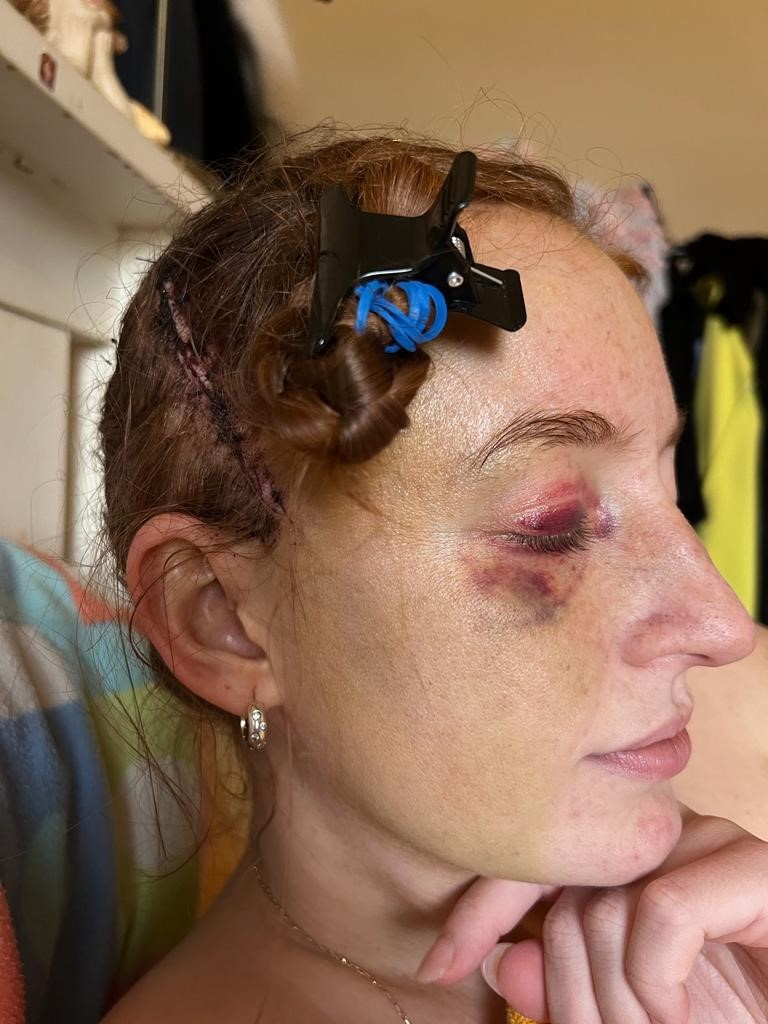Student nurse supports new campaign to highlight common brain tumour symptoms

A student nurse is supporting a new flagship campaign from The Brain Tumour Charity to raise awareness of the warning signs of the disease in children and adults.
Claudia Laird, 25, who is studying in Manchester but is originally from Burnley, is championing The Brain Tumour Charity’s new Better Safe than Tumour campaign which was launched this month. The campaign aims to support the public – whether adults, children, parents, partners or friends – to be aware of the possible signs and symptoms and to get any concerning or persistent symptoms checked out by a doctor.
In adults, these symptoms include persistent or severe headaches which may be worse in the morning, changes to vision including blurs and double vision, tiredness, nausea, speech difficulties and seizures. In children, symptoms may also include balance, co-ordination or walking problems, loss of taste and smell, abnormal head position, regular sickness – especially in the morning, and excessive thirst.
Claudia was diagnosed with a low-grade brain tumour after she was told that by a medical professional at A&E that ‘they don’t give out scans willy nilly’ to people of her age.
It was last year, whilst Claudia was on a placement as part of her nursing training, that she started to get headaches and brain fog. She was working 12 hour day and night shifts at the time so she put it down to exhaustion.
Over the next few weeks, Claudia started being regularly sick, had a high heart rate, loss of feeling in her hands, hallucinations at night, memory loss, blurred vision, distorted hearing, irrational thinking and confusion.
She was misdiagnosed with gastroenteritis twice after telephone consultations with her GP. But after a face-to-face consultation, she was referred to Blackburn Ambulatory Care for a next-day appointment.
Claudia said: “I went home on the advice that if things got worse that I would go to A&E. That evening, when I was studying for one of my nursing exams, I found that I couldn’t read the words clearly on my laptop, I started being sick and then I lost the feeling in one of my hands.
“We went back to A&E but we left at Midnight because we didn’t feel that we were being taken seriously. In fact, a nurse said to us “What are you doing here? GPs always send you here.”
Claudia had a scan the following morning at her scheduled appointment which found the tumour which was later confirmed to be a Grade 2 Astrocytoma. She was transferred by ambulance to Preston Hospital and she had eight hours of emergency surgery to remove it.
Claudia does have some ongoing problems with fatigue and memory and she also has regular scans to monitor her condition but she has been determined to continue with her nursing qualification.
Claudia said: Nobody expects to be diagnosed with a brain tumour at any point in their life and it came as a complete shock to my family and I. The speed of my diagnosis and treatment was paramount for a positive outcome and prognosis. I can’t even think about what may have happened if we hadn’t persisted with speaking to the GP and going to A&E.
“Now that the worst is behind me, I am so keen to raise awareness of this disease amongst both the public and medical professionals. As I continue with my nursing career, I have promised myself that I will always have full respect for anyone I am looking after, do my best to give 100% at all times, and trust my gut instinct to get people checked over if they may need it.”
The Brain Tumour Charity’s Better Safe Than Tumour campaign launches as analysis of NHS cancer incidence data shows that the number of people who have been diagnosed with a brain tumour in England has risen by over 50% in the last two decades (2001-2019).
While the disease remains relatively rare overall, the number of people being diagnosed with a brain tumour, which is the UK’s leading cancer killer of children and adults under 40, rose from 6,577 in 2001 to 9,960 in 2019.
Experts believe the increase in cases in recent years could be explained by the ageing of the population and advances in detection and clinical practice – including the adoption of new diagnostic and imaging tools, molecular testing, new surgical techniques and improved classification and data collection.
In addition, around 40% of cases are still diagnosed in A&E and there was an increase in emergency presentations seen in 2020 due to the pandemic.
It is hoped that the campaign will support more people to recognise the symptoms and visit their GP to rule out brain tumour, and help ensure those who do have a brain tumour can be diagnosed and receive the care and support they need at the earliest opportunity.
Dr David Jenkinson, Chief Scientific Officer at The Brain Tumour Charity, which funds world-class research and provides trusted support for anyone affected by the disease, said:
“We’re really grateful to Claudia for supporting The Brain Tumour Charity’s ‘Better Safe Than Tumour’ campaign by sharing their story to highlight just why we need to raise more awareness of the disease. These worrying figures show how urgently we need to act on this.. While brain tumours remain relatively rare, incidence has continued to rise significantly over the last two decades, and this has unfortunately not yet been matched by the tangible progress in diagnosis, treatment and survival outcomes seen in many other cancers.
“With over 12,000 people now being diagnosed every year in the UK, and the impacts on diagnosis seen due to the pandemic, renewed action to support more people to recognise the signs and come forward to see an NHS doctor has never been more needed. “We absolutely want to reassure people, that despite this increase in cases, brain tumours are still uncommon. But it’s so important that we see greater awareness of the signs and symptoms of the disease to ensure anyone affected can get the diagnosis, treatment and support they need at the earliest opportunity.
“The warning signs vary by age group, as well as due to the type of tumour and where in the brain it is located. We’d encourage anyone who is worried about a symptom that’s unusual for them, and particularly if it is persistent or they experience a combination of symptoms, to speak to their doctor – to help rule a brain tumour out. Anyone concerned can also speak to us on 0808 800 0004 or find out more about the possible signs and symptoms at headsmart.org.uk. We’re here for you.”
Over 12,000 people are diagnosed with a brain tumour in the UK each year, with almost 5,000 people losing their lives to the disease each year. While more people are now surviving cancer than ever before in the UK thanks to NHS investment, research progress and increased charity support funded by the public, progress for brain tumours has continued to lag behind survival improvements seen in other diseases. Just 12% of adults survive for five years after a brain tumour diagnosis, with the disease continuing to reduce life expectancy by 27 years on average – the highest of any cancer.
Better Safe than Tumour builds on the success of The Charity’s prior initiative in paediatric brain tumours, HeadSmart, which launched in 2009 in partnership with the Royal College of Paediatric and Child Health and the University of Nottingham, to raise awareness of the signs and symptoms in children and teenagers.
Following HeadSmart’s impact in helping reduce average diagnosis times in younger people from 13 to 6.5 weeks, the award-winning campaign has now been refreshed and expanded to cover the signs and symptoms in both children adults.
Claudia added: “The signs and symptoms of a brain tumour can so easily be mistaken for other medical conditions, just like I experienced. Even with my medical training, I put some of my symptoms down to my very demanding nursing placement. I went through so much to get an accurate diagnosis – if that doesn’t illustrate the need for more awareness then I don’t know what does.
“Being turned away by healthcare professionals is both frustrating and upsetting. Greater awareness will therefore not only help to prevent symptoms from escalating and potentially save lives but also help alleviate the psychological impact such situations can have on someone affected and their loved ones.
“It’s really hard for anyone to accept that they may have a brain tumour – it’s not a cancer which is frequently discussed. But, by talking about it, people can be empowered by knowing what a diagnosis may mean and not be worried about going to see their GP if they do have any concerns.”
The Brain Tumour Charity is the world’s leading brain tumour charity and the largest dedicated funder of research into brain tumours globally. To find out more about the possible signs and symptoms of a brain tumour,
visit www.headsmart.org.uk.




